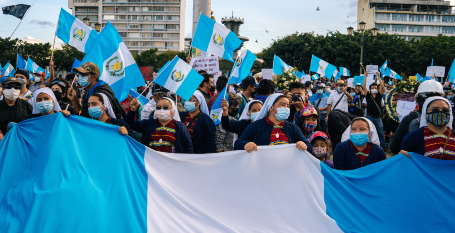The Life and Family Protection Law was recently passed by the congress of Guatemala.
The legislation will officially come into law once it has been signed by Guatemala’s president, Alejandro Giammattei.
Currently, people who choose to have an abortion are criminalised in Guatemala, and can be punished with up to three years in prison. The new legislation will triple this sentence, bringing it to 10 years.
While there is already no provision for same-sex marriage in Guatemala, the law will amend the civil code to expressly prohibit it.
The law will also ban schools from any teaching or policies that promote LGBTQ equality. The law describes such teaching as “promoting in children and teenagers policies or programs that tend to lead to diversion from their sexual identities at birth”.
Activists are planning to challenge the legislation in the constitutional court of Guatemala.
What's life like for LGBTQ people in Guatemala?
What’s life like for LGBTQ people in Guatemala? Let’s take a look at some of the key equality indicators.
Is homosexuality legal in Guatemala?
Yes. Same-sex sexual activity was decriminalised in 1871.
Are there anti-discrimination protections in place for LGBTQ people in Guatemala?
No. There is not a comprehensive anti-discrimination framework that includes a prohibition of discrimination on the grounds of sexuality.
Is there Marriage Equality in Guatemala?
No. There is no legal recognition of same-sex relationships.
In January 2018, the Inter-American Court of Human Rights ruled that the American Convention on Human Rights mandates and requires the recognition of same-sex marriage. The ruling sets a binding precedent for a number of countries, including Guatemala.
There appears to be little appetite from the government to move towards Marriage Equality, so it’s likely that specific legal challenges will need to be pursued in order to bring the laws of Guatemala into line with the ruling of the Court of Human Rights.
What’s life like for LGBTQ people in Guatemala?
Guatemala is a socially conservative country.
Religion plays a key role in shaping negative perceptions of LGBTQ people.
What’s the history of homosexuality in Central America?
The Mayan civilisation – which controlled this part of the world before colonisation by the Spanish – appears to have recognised same-sex sexual activity as part of its society.
In Mayan culture, there was a strong association between ritual and homosexual activity. Some shamans engaged in homosexual acts with their devotees, and priests engaged in ritualised homosexual acts with their gods.
Following Spanish conquest and the incorporation of modern-day Guatemala into the Viceroyalty of New Spain, sodomy became punished with burning at the stake. Christianity, which has traditionally regarded homosexuality as sinful, was also introduced to the region, and thus the relative openness surrounding homosexuality disappeared.x

